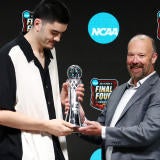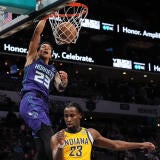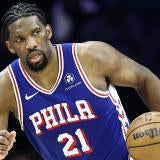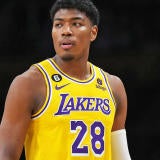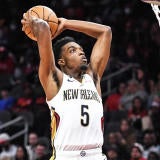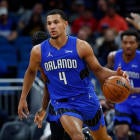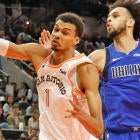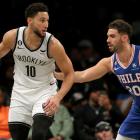The key with rookies is to temper expectations. Always.
It is tempting to look at the spry young athletes that we just watched dominate the college game for (at least) the last year and project instant stardom. Fans of every team picking in the lottery are convinced the 19-year-old kid they just grabbed from a Final Four tourney team is their savior. Those in the latter half are sure their team outsmarted everyone else to pick the next Tony Parker or Tayshaun Prince -- that hidden gem everyone overlooked.
Fantasy owners can easily fall for the same traps, though we tend to think of ourselves as less emotional and more rational than the fan rooting on his hometown team. And for the most part, that holds true. Last season, only six rookies were among the first 150 players taken on average in CBSSports.com leagues, and one had been selected two years earlier and spent his entire adult life playing professionally in Europe.
Still, this year’s draft class is expected to be one of the deepest in years, so I’d expect to see more of those unproven names come off the board earlier. We can’t help it. We fall in love with potential. Why draft an aging, but dependable Mo Williams when you can go with the home-run swing?
Since we know they’re going to be coveted on Draft Day, let’s take a look at those rookies who were put in the best and worst positions to succeed immediately, as well as some of the veterans whose futures might have changed as the draft chips fell.
Lottery picks most likely to make an impact
Dion Waiters, guard, Cavaliers: This was widely considered to be a reach for the Cavaliers at No. 4, who had their eye on both of the wings that went before Waiters -- Michael Kidd-Gilchrist and Bradley Beal. However the Cavaliers are thrilled to add the 19-year-old out of Syracuse, who joins the Hawks' Marvin Williams as the only lottery picks to never start a game in their college careers. That isn’t great company to join, though Williams did not enter into as good a situation as Waiters is in Cleveland. The Cavaliers are desperately in need of scoring next to budding superstar Kyrie Irving as they ranked 25th in the league in points per game last season while receiving terrible production from the off-guard spot. Waiters averaged just 12.6 points last season as the Orange’s sixth man, but I’m betting he tops that with Irving next to him.
Harrison Barnes, forward, Warriors: Barnes falling to the Warriors at the seventh pick took a perfect confluence of events in the first six picks, and this is a great fit. Barnes’ college career was widely considered a disappointment, though he is still a tremendous athlete who averaged 17.1 points per game while playing for one of the most competitive programs in the nation as a sophomore, so maybe he is guilty only of failing to live up to unfair expectations. He should be playing with a chip on his shoulder as a pro, and he enters a team that played at the 10th-fastest pace in the league last season and generally finds open shots for guys on the wing. Even perpetual disappointments Brandon Rush and Dorrell Wright combined for 20-plus points per night last season, a number Barnes will surely take a big bite out of.
Anthony Davis, forward/center, Hornets: Well, duh. Davis is considered the biggest sure-thing in the draft in years, as he is expected to step onto an NBA floor and absolutely control the defensive game. His Fantasy value could fluctuate wildly depending on whether he ends up being classified as a center or a power forward, as his offensive potential is somewhat limited, at least right away. Still, he should be a nightly double-double threat, though he will likely have more nights below double figures in scoring than most top picks. He should be a high-end No. 2 center at worst, as he will head into the season as the odds-on favorite to lead the league in blocks. The best comparison for him from day one might be a smarter Javale McGee, who is coming off a season averaging 11.3 points, 7.8 rebounds and 2.2 blocks per game.
Bradley Beal, guard, Wizards: Much like Waiters in Cleveland, Beal fits a much-needed role next to a dynamic young point guard. Beal will slot next to 2010 No. 1 pick John Wall, who will play next to a legitimate three-point threat for the first time in his young career. At least, that’s the plan for Beal, who draws comparisons to future Hall-of-Famer Ray Allen despite coming off a season in which he shot just 33.9 percent from three-point range. Many have attributed that poor showing to the way the Gators used Beal, as he is more of a natural two-guard than the small forward Florida seemed to peg him as. One skill that should definitely translate for Beal is his rebounding, as he averaged 6.7 boards per game, an impressive total for a 6-foot-5 guard. Even if his shot is not quite what everyone expects it to be, Beal’s ability to fill up the stat sheet makes him more attractive than his potentially pedestrian scoring might lead you to believe.
Kendall Marshall, guard, Suns: Some thought the Suns reached a bit when they took Marshall at the 13th pick in the draft, however, for Fantasy purposes, this is one of the best situations for any rookie to fall into. If free agent Steve Nash stays in Phoenix, his declining minutes will still leave plenty of chances for Marshall to show off his passing ability. If Nash bolts, however, that leaves Marshall as the best option to run what has been one of the NBA’s most consistently fast-paced offenses, which should prove to be a perfect fit for the best pure passer in the draft. Marshall does not bring much in the way of scoring ability, however, his immediate upside could be similar to Ricky Rubio’s, as Marshall averaged 9.8 assists per game as a sophomore at North Carolina.
Non-lotto picks who could surprise
Jared Sullinger, forward/center, Celtics: Sullinger is considered the most-polished low-post scorer in the draft, and would have been a top-five pick had he exited after his freshman season last year. However, concerns about a back injury and a lack of athleticism dropped him to No. 21 in the draft, despite an equally excellent sophomore year that saw him extend his shooting range out to the three-point line while increasing his defensive production. Going to a team that has very little interest in running should benefit Sullinger, as the Celtics should be content to dump it down to him on the block a few more times per game than most teams. Playing next to Kevin Garnett can only help, as Sullinger will learn the ins and outs of the defensive game, allowing him to log more minutes than he otherwise might.
Marquis Teague, guard, Bulls: Normally, being drafted by a roster that has a 23-year-old, former MVP in house and signed to a long-term deal at your position would be a bad sign for your Fantasy value. However, considering Derrick Rose might miss the entire season, Teague is actually in a decent spot. The Bulls are loathe to pay the luxury tax, which might mean that one or both of C.J. Watson or John Lucas could be moved before the start of the season, freeing Teague up for a prominent role. Teague has the skill of a lottery pick, though he was not asked to do much for Kentucky last season. He still averaged 10.0 points and 4.8 assists per game as a freshman, and he is a tremendous athlete (in the mold of Rose). He might need some seasoning, like his brother, Hawks guard Jeff Teague, but he is in a position to make some noise from day one.
Doron Lamb, guard, Bucks: Lamb is expected to come off the bench for the Bucks, though as a second-round pick, he is not even guaranteed a spot on the roster. Still, coming off the bench might not be the worst thing in the world for him, as it brings to mind an obvious Jason Terry comparison, a similarly sized combo guard who has made a career out of providing punch off the bench. Lamb is a tremendous three-point shooter, so at the very least he might emerge as a Rotisserie specialist, for his ability to pour in threes off the bench on a team that, coincidentally, just traded its backup shooting guard.
Wait-and-see lottery picks
Terrence Ross, guard/forward, Raptors: The Raptors insist Ross, who they selected with the No. 8 pick, was the seventh-rated player on their draft board. Hey, that’s great. And it is not necessarily difficult to see what they like about an athletic wing who can defend and showed three-point range in college, even if the pick was widely criticized. The issue with Ross from a Fantasy perspective is one of fit. He seems destined to fill a similar role that DeMar DeRozan has on the team currently. The two aren’t quite the same players, as Ross has a working jump shot, but how will the Raptors find the touches for Ross right away? He will probably spend most of his rookie season spotting up and cutting off the ball, which limits his ability to impact the box score.
Michael Kidd-Gilchrist, forward, Bobcats: Everybody loves Kidd-Gilchrist’s prospects as an NBA player, and for good reason. He has developed a reputation as a relentless competitor and defender, who will almost certainly make the most of his considerable physical gifts. However, it is tough to see how he will translate into a viable Fantasy option right away, as his skills may not immediately show up in the box score. MKG has work to do on his offense, specifically with his jump shot, though at Kentucky he was smart enough to use that jump shot on only 22.4 percent of his shot attempts. That Wildcats had playmakers everywhere and an elite defense that let MKG stay off the ball and get out in transition often, where he thrives. Charlotte, on the other hand, has two shoot-first point guards and almost nothing in the way of solid defensive players beyond Kidd-Gilchrist. He might be asked to carry too heavy an offensive load right away, and he simply may not be up for it yet, which could lead to inefficient scoring and a high number of turnovers at first.
Andre Drummond, center, Pistons: As he enters the NBA, most experts’ opinions of Drummond stands in stark contrast to Kidd-Gilchrist’s -- everyone loves his potential to be a dominant player on both ends of the floor, but everyone is equally terrified of the risk that he will flame out. That is the reason why the athletic big man, generally among the most coveted assets in any draft, fell to Detroit at No. 9. This is going to be a project, as Drummond will probably be asked to focus on defense and cleaning up the glass in his first season, with the Pistons continuing to run the offense through emerging star Greg Monroe. Questions persist about his effort level and willingness to devote himself to the game, but the biggest short-term issue is that Drummond is simply a totally raw prospect. He seems a lot like DeAndre Jordan coming out of school, who took a few years to emerge as a viable Fantasy option.
Meyers Leonard, center, Trail Blazers: Much like Drummond, Leonard is expected to be something of a project, though he is a more skilled and accomplished big man than Drummond at this point. Leonard is a more physically-developed prospect than Drummond, and he was able to carry a bit of a bigger load offensively in college. Also, like Drummond, he will be joining an established presence in the front court, as he will try to fill the defense and toughness role next to LaMarcus Aldridge. He was able to defend without fouling as a sophomore at Illinois, which might be his best immediate asset, especially since Portland already seems just about set in terms of offense.
John Henson, forward, Bucks: Are you seeing a pattern emerging here? Stepping into the NBA and making an impact as a young big man is incredibly difficult for the vast majority of prospects, due to the huge physical gap between the league and college. Henson enters the NBA as a skinny, bouncy power forward with a decent jump shot and a propensity for blocked shots. That has value, however in Milwaukee it seems redundant, considering the presence of Ekpe Udoh and Samuel Dalebert, not to mention the possible return of unrestricted free agent Ersan Ilyasova. Henson will battle it out for minutes with the incumbents and might find playing time hard to come by as a rookie.
Five veterans whose future changed
Steve Nash, guard, Free Agent: Nash’s old team, the Suns, hope to bring him back this offseason, however as covered earlier, they acquired a fine insurance policy when they selected Marshall. There are plenty of teams who would love to add the veteran, however it has been reported that he is leaning toward either a return to Phoenix or either Portland or Toronto as his destinations. Any of those destinations would be fine for him, as each has existing offensive talents that suit Nash’s game. Toronto, in particular, looks poised to make a strong run for him, especially with the selection of another wing who works best with the ball out of his hands. If Nash lands in Toronto, expect the Raptors to use their amnesty provision to waive Jose Calderon possibly creating a new set of dominoes that could fall.
Jarrett Jack, guard, Hornets: The Hornets, who already have Jack and Eric Gordon in the back court, added Duke's Austin Rivers with 10th selection in the draft, essentially giving them three combo guards whose skill sets overlap. Jack had a solid season for New Orleans while serving as the point guard, averaging 15.6 points and 6.3 assists per game, however, they now have to find a way to split two positions between three similar players, and it would not be a surprise to see Jack end up seeing a reduced role. He averaged a career high 34.0 minutes per game, but with two younger and more talented players looking for minutes, expect Jack to end up as the odd man out, if he is not traded outright at some point.
Jordan Crawford, guard, Wizards: Crawford has been able to put up decent point totals over the last two seasons, however, it has often come at the sake of the Wizards’ offensive flow. He is not an efficient scorer or a good passer, and now that Beal is in house, he is probably going to shift to a backup role. He may start at first, but Beal and Wall are the clear future for Washington. If Crawford can figure out how to evolve into a better decision-maker, he might fit into a similar Jason Terry-esque role that Lamb is expected to fill. However the days of Crawford taking the ball and finding his own shot are seemingly over in the nation’s capital.
Anderson Varejao, center, Cavaliers: Along with Waiters, the Cavaliers drafted North Carolina’s Tyler Zeller with the 17th pick, a player they expect to be their center of the future. They spent much of draft night reportedly trying to move Varejao, which does not come as much of a surprise, as he is one of the few older players with a large contract on the Cavs’ roster. He was averaging a double-double last season before suffering his second season-ending injury in two years. As a 30-year-old when the season begins, there doesn’t seem to be much room for Varejao in the team’s immediate future. They might keep him around to see if there is enough talent for a surprise playoff run, however Varejao’s days with the Cavs are clearly numbered.
Brandon Bass, forward, Free Agent: Bass played a larger role for the Celtics than he ever had before in his career, averaging 31.7 minutes with 12.5 points and 6.2 rebounds per game -- all career highs. All of this came at a great time for him personally, as he is now a restricted free agent. The Celtics are up in the air as far as their plans for next season go, as a number of key veterans other than Bass might be gone. But one thing is certain -- the team wanted to add size in the draft, and they did just that, with Sullinger and Syracuse's Fab Melo. It is not clear where these moves leave Bass, but there are now reports indicating that the Celtics may be looking to package him in a sign and trade, as he may be pricing himself out of their range. At 26, Bass’ best days are ahead of him, and he may be able to find a team that can feature him more prominently, as his mid-range and offensive rebounding skills are highly valued among NBA teams.
Derrick Rose, guard, Bulls: With the Bulls landing Teague, the obvious question now becomes whether Chicago knows something about Rose’s return from knee surgery that they aren’t making public. The timeline for his recovery has always put his earliest expected return around the All-Star break, though they have also consistently said it is not out of the question that he misses the entire season. This selection might just be for depth, but it might also be an indication that the Bulls don’t have much hope for Rose returning this season and are looking toward the immediate future. It will be a fascinating subplot to follow during the first half of the season, as he could potentially swing Fantasy leagues if he makes a comeback by the end of the season.








